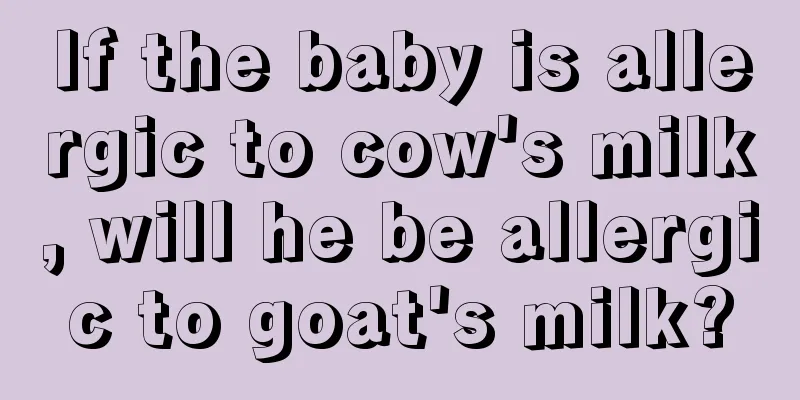If the baby is allergic to cow's milk, will he be allergic to goat's milk?

|
In daily life, some mothers often ask this question, that is, if the baby is allergic to cow milk powder, can it be replaced with goat milk powder. Some mothers even ignore the scientific basis and directly believe the words of the marketers who sell milk powder and directly switch to goat milk powder. Little did he know that his behavior was extremely unwise. So if the baby is allergic to cow's milk, will he be allergic to goat's milk? First, let’s look at the two main reasons why babies don’t accept milk. First, some babies are born with a lack of lactase. This enzyme can break down the lactose in milk in the body. If this enzyme is lacking, milk will be difficult to digest, and uncomfortable symptoms such as bloating, diarrhea, and gas production will appear. Second, it is also possible that the baby is allergic to the protein in milk. The most obvious symptoms of allergies are diarrhea and eczema (the main allergic symptoms for babies aged 0 to 3 years old). Whatever the reason, it is unwise to replace cow's milk with goat's milk. From the perspective of preventing or treating milk allergy, the similarity between goat milk protein and cow milk protein reaches 92%. Most babies who are allergic to cow's milk are also allergic to goat's milk. We know that only food that is closest to breast milk is the best for babies. Cow's milk and goat's milk are the best foods for calves and lambs respectively, while human milk is the best food for babies. We use a scientific ratio table to compare the differences between goat's milk, cow's milk and human milk. It is a lie that goat milk is closer to breast milk than cow milk in terms of the proportion of protein composition. In terms of lactose intolerance, the carbohydrate content in cow's milk is 3.4g/100g, and in goat's milk is 5.4g/100g (data source: "Chinese Food Composition Table 2007 Edition"). The carbohydrates in milk are mainly lactose, so if you are lactose intolerant to cow's milk, you will also be intolerant to goat's milk, which has a higher carbohydrate content, and the chance of diarrhea from drinking goat's milk may be higher. So after the above introduction, mothers should understand that if the baby is allergic to cow's milk powder, they cannot directly switch to goat's milk powder. Therefore, out of responsibility for the baby's health, if the baby is allergic to milk, do not let the baby come into contact with cow's milk or goat's milk products. Either let the baby eat breast milk, or add some nutritious complementary foods. |
<<: What are the dangers of milk allergy in babies?
Recommend
Be careful! Children who often eat off-season fruits are prone to precocious puberty
In modern life, people's living standards are...
What are the benefits of moxa fumigation for children?
As children grow and develop, their body function...
How to deal with a fever after a baby gets a measles vaccine
After a baby is born, he or she will get a vaccin...
What is the normal height for a 20 month old baby?
All mothers are very attentive during their baby&...
How to make shrimp porridge for babies?
Drinking porridge is a way of eating that people ...
How effective is baby saline solution for treating nasal congestion?
Infants and young children are prone to nasal con...
Is emergency room visit contagious for young children?
Young children have relatively weak constitutions...
What are the effects of precocious puberty?
Nowadays, more and more children eat food that is...
Physical therapy for fever in children
Fever has always been one of the common symptoms ...
What is the treatment for children's morning retching?
We all know that many people have experienced vom...
The best way to treat stuttering in children
Stuttering is very common. There are many reasons...
What should I do if my baby’s conjunctiva is inflamed?
Many parents say that their babies have been acti...
How many months can a baby be held upright?
Babies are very cute, and their tissues and organ...
How many months does the baby need to be shielded from light?
Since babies cannot speak, they need a quiet and ...
What to do if the fever persists
In daily life, illness is the most common thing t...









